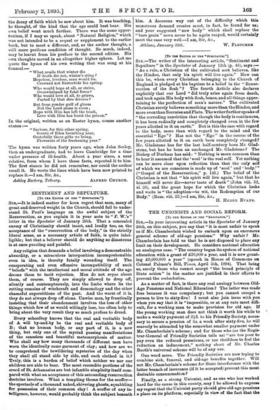[To THY EDITOR OP THE "SPECTATOR."] Sta,—The writer of the
interesting article, "Sentiment and Sepulture" in the Spectator of January 12th (p. 46), says :- " As a rale, a Christian of the cultivated sort believes, like the Hindoo, that only his spirit will live again." How can this be, when every Christian belonging to the Church of England is pledged at his baptism to a belief in the " Resur- rection of the flesh " ? The fourth Article also declares explicitly that our Lord " did truly arise again from death, and took again His body with flesh, bones, and all things apper- taining to the perfection of man's nature." The cultivated Christian surely believes something more than theHin.doo, and more even than Socrates and Plato. The writer further speaks of " the corroding conviction that though the body is continuous, it has been radically and completely changed even in the few years allotted to it on earth." But is this the case with regard to the body, more than with regard to the mind and the essential " Ego "? Has not the " Ego " in the course of the few years allotted to it on earth been completely changed? Mr. Gladstone has for the last half-century been Mr. Glad- stone, but has he been an unchanged Mr. Gladstone ? The Bishop of Durham has said : " Nothing is more common than to hear it assumed that the ' soul' is the real self. Yet nothing can be more clear upon reflection than that the only self of which we are conscious is made up of 'soul' and body." (" Gospel of the Resurrection," p. 141.) The belief of the Christian is not that " his spirit will live again," but that he himself will never die—never taste of death " (John viii. 52, xi. 26), and the great hope for which the Christian looks and waits is " the adoption—to wit, the Redemption of our Body." (Rom. viii. 23.)—I am, Sir, &c., H. HEBER EVANS.


































 Previous page
Previous page